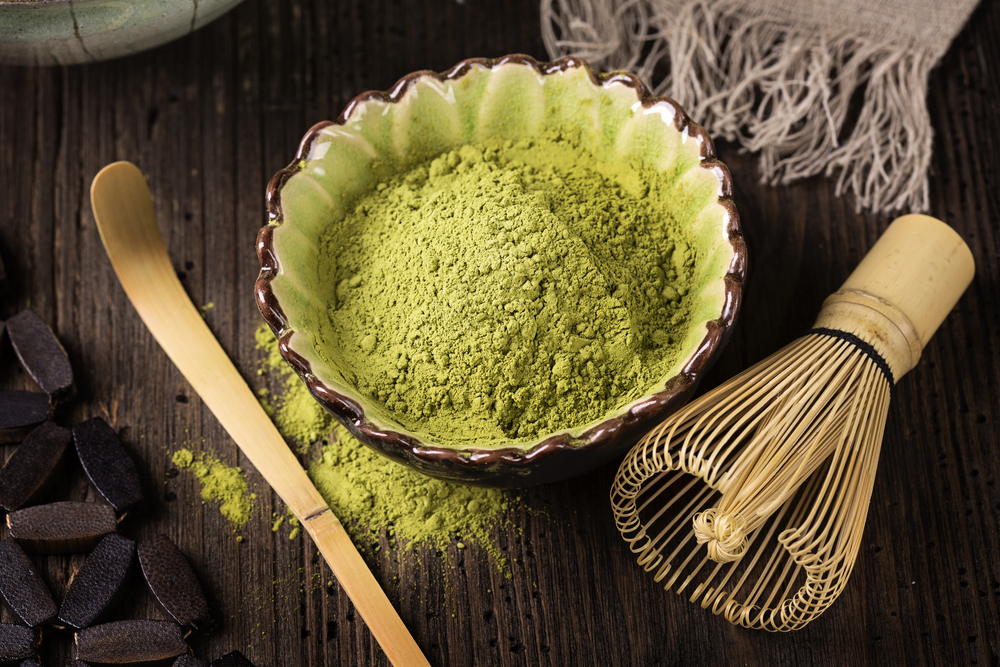What is Matcha?
Matcha is a Japanese green tea made from finely powdered dried green tea leaves. It has a slightly bitter, vegetal taste and a vibrant green color that results from the leaves’ high chlorophyll levels. This tea is the tea of choice in Japan and is a big part of traditional Japanese tea ceremonies for centuries.
What are the benefits of matcha?
It’s loaded with antioxidants and vitamins.
Green tea contains a type of antioxidant called catechins, as well as another group called polyphenols. “Matcha powder offers a megadose of these powerful antioxidants, which can help reduce cell damage and prevent chronic disease,” says nutritionist Jenna Gorham, RD, founder of Jenna Gorham Nutrition Consulting in Bozeman, Montana.
It might boost your skin’s glow.
Miyashita recommends trying matcha instead of coffee for a week if you have skin concerns, because of its sky-high vitamin levels. Vitamin C stimulates collagen production when ingested according to this study in the journal Nutrients. And vitamin B can help to promote healthy skin cell turnover, according to a study from the Advances in Skin & Wound Care journal.
You’ll get more energy than you would from other teas.
Matcha powder has about three times the amount of caffeine as alternative types of brewed teas, says Gorham. Black tea has 47 mg of caffeine per cup, and green tea has 28 mg, while matcha has 70 mg of caffeine. That’s about the same energy benefit—or slightly less than—a cup of coffee, which has around 96 mg of caffeine per cup (given that different coffees have different levels of caffeine).
You won’t feel as jittery as you might from a cup of joe.
“Matcha powder contains L-theanine, an amino acid that has been shown to reduce stress,” Gorham says. One 2016 study found that drinking a beverage with around 25 mg of L-theanine like green tea can be extremely effective at reducing stress and increasing the neurotransmitter gamma-aminobutyric acid (GABA) in the brain. “People say that when they drink matcha, they have a smooth alertness and don’t experience a ‘caffeine crash,’ which could have to do with the L-theanine component,” Gorham adds.
It can make you significantly more productive.
In a 2017 study published in Food Research International, people who drank matcha specifically (not just plain old green tea!) experienced a slight increase in attention and processing speed an hour later—likely due to a special combination of L-theanine, a major potentially energy-boosting polyphenol called epigallocatechin gallate (EGCG), and caffeine.
So on your busiest workdays, splurging on a matcha latte (which can be upward of $5, if the matcha powder is good quality) might just be the perfect investment. Or, you can always DIY one.
Matcha could help ward off cancer.
While there’s no specific research proving the anti-cancer benefits of matcha powder itself, scientists have been reviewing green tea as a category for years. Older studies have linked the powerful antioxidant EGCG to cancer prevention and preventing colon cancer cell growth. One other study indicates that green tea could be effective in synergy with anticancer drugs for cancer prevention. It’s the EGCG that’s the magic compound, which might inhibit cancer cell growth by killing malignant cells.
Drinking green tea may promote healthier cholesterol levels.
EGCG strikes again: Science hasn’t exactly concluded why, but a 2016 review of studies suggests that thanks to this compound, consuming green tea regularly can result in a significant reduction in bad cholesterol (often called “LDL”). LDL is the type of cholesterol that leads to a buildup of fatty acids in the arteries, which some experts say increases your risk for heart attack and stroke.
It can strengthen your bones.
Most people don’t think about actively taking measures to build bone strength, but it’s important for your fitness and mobility, especially as you age. Polyphenols, the antioxidant-packed compounds in green tea, may increase bone mineral density (as in, how solid your bones are) by reducing inflammation-causing oxidative stress on the bones. That in turn can lower your risk of developing osteoporosis, according to several past studies.
How to make matcha?
Step One
Add 1 teaspoon of matcha into a bowl and reduce clumps using the bamboo matcha scoop.
Step Two
Add some hot water (just enough to cover the matcha powder) just under a boil and whisk using the bamboo matcha whisk.
Step Three
Add more hot water and whisk vigorously in a zig zag motion until the tea is frothy.
Step Four
Enjoy your matcha tea straight from the bowl.
Our Products
Sources:
https://www.loveandlemons.com/matcha-green-tea/
https://www.healthline.com/nutrition/7-benefits-of-matcha-tea#The-bottom-line
https://www.womenshealthmag.com/food/a27127259/matcha-powder-benefits/
https://matchasource.com/how-to-prepare-matcha-green-tea/


